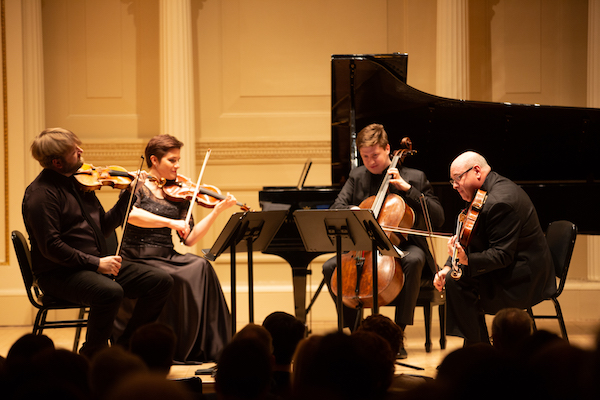Paterson premiere, Schumann shine in Indianapolis Quartet’s Carnegie debut

New York in spring would be a great place to celebrate one’s 50th birthday, even if one weren’t having three world premieres. But composer Robert Paterson is doing all that and more during a run of performances of his works stretching from Thursday night into May, mostly at Carnegie Hall.
Thursday’s concert in Weill Recital Hall presented the Indianapolis String Quartet in its New York debut, in a varied and enjoyable program that included the world premiere of a work it commissioned, Paterson’s Quartet No. 3.
The rest of Paterson’s New York spring will feature his choral works and an evening-long cycle of song cycles, The Four Seasons, 20 years in the making and premiering in its complete version on the composer’s actual birthday next month.
Although no singers were onstage Thursday, even here the composer, in a program note, cited words and songs as the inspiration for each of his new quartet’s five movements. As if to liberate himself from the old-school lyricism of his vocal works, Paterson set the string quartet stuttering and blurting with angular attacks in the first movement, “Twist and Shout,” evoking, in his words, “someone who has a severe case of Tourette’s Syndrome.” This music’s complex meters and aggressive stance—not to mention the entire quartet’s five-movement form—put one in mind of Bartók.
Paterson was even more specific about the inspiration for the second movement, “Poet Voice,” which mimicked the speech patterns of the poet Louise Glück reciting her poem “The Wild Iris.” Chattering violins over a deep drone gave way to an intense three-way dialogue as the plant worked its way to the surface to announce spring’s arrival.
The central scherzo, “Auction Chant,” cleverly mixed bowed and pizzicato notes to imitate the rapid-fire delivery of a country auctioneer, in a tour de force of tight ensemble and interplay by the Indianapolis Quartet—violinists Zachary DePue and Joana Genova, violist Michael Isaac Strauss, and cellist Austin Huntington. The county-fair scene also included violins singing together in plaintive thirds and a somewhat leering country fiddler.
In “Effects Pedal,” the retro medium turned the tables on the avant-garde, showing that one doesn’t need a pedal and a vocoder to produce echoes, loops, smears and other “electronic” effects with a string quartet.
“Anthem,” the mock-inspirational finale, had fun with snippets of TV sports themes and college fight songs in contrapuntal dialogue, bringing at least one loud chuckle of recognition from a member of the audience. Ironically, this busy music celebrating all things rah-rah didn’t develop much momentum itself. Applause for the players and the composer afterward was appreciative, but they weren’t called back for another bow. Nevertheless, it was clear that Paterson had added a lively and imaginative new piece to the string quartet repertoire.
Thursday’s program opened with another five-movement quartet by a contemporary American, Frank Felice’s Five Whimsies for Non-Grownups, composed in 2010. Starting with deliciously nonsensical quotations from classic children’s books by Maurice Sendak, Chris Van Allsburg, J.R.R. Tolkien and Dr. Seuss, the Indianapolis-based composer spun out fantastical miniatures that were by turns bustling, spooky, speedy, drowsy, and chaotic—all the things that kids like best.
Felice’s felicitous handling of the quartet medium added contrapuntal wit to music that, by evoking a child’s emotional world in both its primary colors and its nuances, earned a spot next to such naïve/knowing works as Schumann’s Kinderszenen and Debussy’s Children’s Corner.
Coincidentally, those two composers accounted for the rest of the music on Thursday’s program, Schumann with his Piano Quintet in E-flat major, Op. 44, and Debussy with the closing work, the Quartet in G minor, Op. 10.
Pianist Drew Peterson, joining the quartet for the Schumann, lit a fire of Romantic inspiration under the performance. Although this quintet, with its athletic exuberance and lovely melodies, might be considered a can’t-miss piece, performances of it that are as deeply inhabited and as communicative as the one on Thursday don’t come along very often. Whether he was stepping out boldly or throttling back in support of a luminous cello solo, Peterson’s technical assurance and heartfelt phrasing made him the ideal chamber music partner, and his colleagues matched him phrase for phrase.
The second movement’s slow march stepped exactly in time with its mournful dotted rhythm, the long notes and rests stretched to their full value, and the lyrical and stormy episodes had their full effect as well. The Scherzo’s scampering triplets flew fast but clear, and again right in time, so that Schumann’s rhythmic jokes paid off. The vigorous minor-key finale had a jolt of alla turca fire but took its time over the swoony episodes, and the cheeky fugal coda had the audience cheering.
Closing the concert, Debussy’s quartet proved less satisfying than the other works on the program. The players weren’t as rhythmically clear in the syncopated main theme as they had been in previous pieces, and voicing Debussy’s rather dense texture would have taken at least a first violin willing to stand out more. The scherzo’s frothy mix of spiccato and pizzicato was rhythmically accurate but earthbound. The slow movement dozed in its muted first pages, but rose to a passionate forte by the end. The capable group’s limited color palette was most noticeable in the rather flat landscape of the finale.
Nevertheless, the audience applauded warmly and long, in gratitude for a generally exciting evening of new and old music.
The New Amsterdam Singers, with marimbaist Makoto Nakura, will perform the world premiere of Robert Paterson’s I Go Among Trees, and works by Britten, Persichetti, and Moeran, 8 p.m. March 20 and 4 p.m. March 22 at Theater at St. Jean Baptiste. nasingers.org; 914-712-8708.